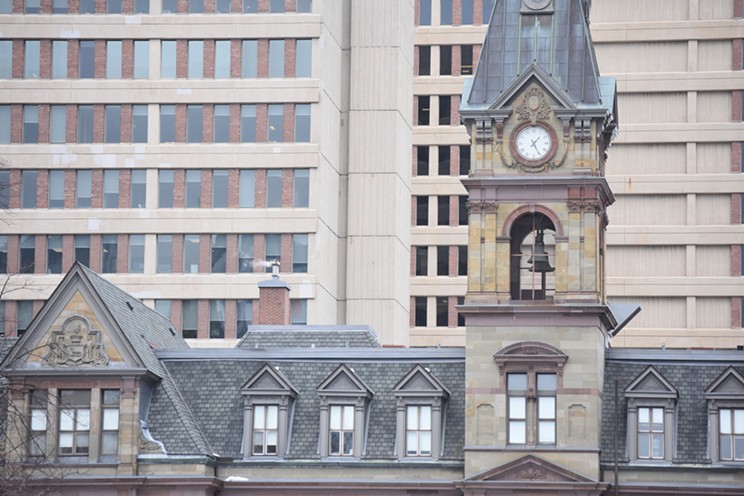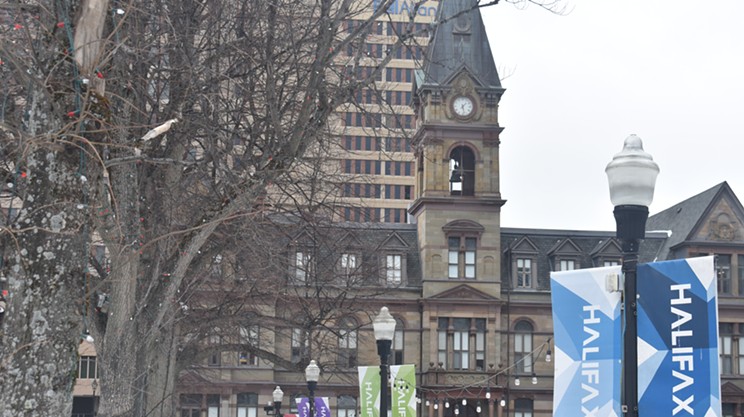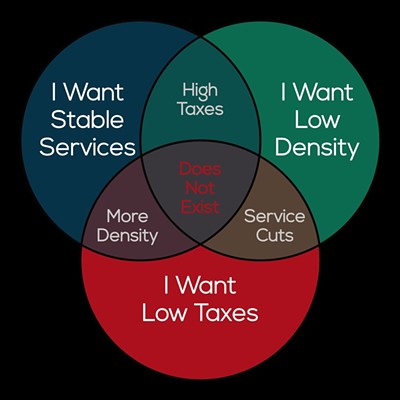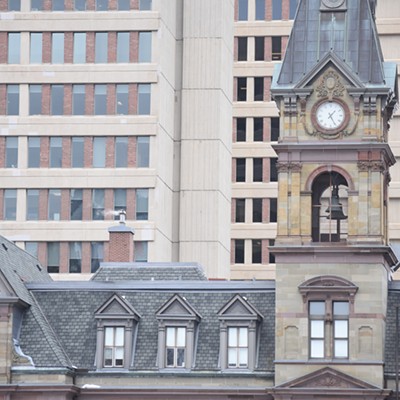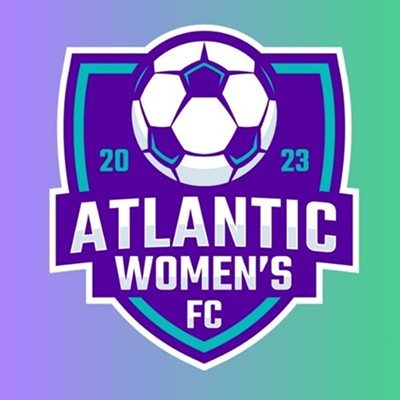Councillor Trish Purdy demonstrated some ruthless political chops at Tuesday’s HRM council meeting. Purdy has a habit of asking questions that are already answered in the reports given to council prior to meetings. Councillors are expected to read these reports before the meetings. During a debate about selfish idiots making their cars loud, Purdy asked the Halifax Regional Police rep how they knew to be at a meeting where a report they worked on was being presented to council. This is a dumb question because the meeting agendas are public, and people who work on reports know when they have to be at council. And failing that, the city clerks have been known to send email reminders. The HRP officer duly answered the question and it seemed like Purdy was once again falling into the habit of asking a question already answered. But she wasn’t—she was setting a trap.
“Where’s the RCMP?” she asks.
Halifax’s city council is finally starting to learn that the Mounties—who somehow thought it was acceptable to not even bother reading the Mass Casualty Commission report—also, shockingly, can’t be bothered to show up to council.
This lack of accountability is one of the many reasons council (as the committee of the whole) sent the integrated policing report to the Board of Police Commissioners and demanded it come back in 18 months. This will likely be the last major piece of legislation many of our current councillors work on—expect those debates to be fierce—and since about half of them are expected to be leaving in 2025, they will likely push hard for reform, since any outcomes of thier decision (good or bad) will be the next council’s to deal with.
As a reminder, the report found that the dual policing model in the HRM isn’t working. It recommends the city’s two police forces should be integrated into one force that’s accountable to the city. Right now, Halifax has two police forces that can’t work together (arguably made harder, if not impossible, due to section 52 of the Police Act), and since the RCMP is a federal police force, it is not accountable to either the city or the province, which is how it keeps getting away with not doing its homework and failing every major test put in front of it.
On to City Hall!
Things that passed
The Women’s Advisory Committee and the African Descent Advisory Committee had their terms of reference changed, and need new councillors for the next two years. Councillors Becky Kent and Lindell Smith were selected for the two respective board positions.
The Sackville Sports Stadium is falling apart and needs repairs. The councillors for the area, Lisa Blackburn and Paul Russell, have asked for a plan for repairs to start in 2027. Unfortunately, if the city continues to subsidize automotive infrastructure as it has for the past 50 years or so, there won’t be enough money to make these improvements as well as the required improvements to things like the North Library or the Forum. If parking stays cheap or free, expect this plan to get perpetually deferred in the budget adjustment list process every year.
The tipping fees for commercial compost out at Otter Lake are going up by $10, to $100 per tonne. City staff say that this fee is still cheaper than other places, so businesses are incentivized to throw out their organic waste at Otter Lake. The HRM does make this compost available to residents of the HRM through various local soil sellers. It is usually about $10 cheaper per cubic yard ($55 vs. $65), but it has a lot of plastic in it and isn’t great as a growing medium.
The owner of 1266 Barrington Street, Sterling Hotels Limited, wants council to give it a $150,465.24 bonus zoning subsidy because the renovations to the property are going to cost $1.125 million. Council has the power to give Sterling Hotels Limited this subsidy because this 1266 Barrington is a heritage property and maintaining heritage buildings is in the public good, as per attachment one of this report. Sterling Hotels Limited plans on using this bonus density to turn a parking lot into an apartment building.
In 2009, city council started the process of creating a sweeping municipal plan for the downtown core. Five properties were exempt from this initial plan: 1872-1874 Brunswick Street, 1591 Granville Street, 5182 Blowers Street, 1470 Queen Street and 1649 Bedford Row. This plan should help the administrative process of removing these properties from their protected grandfathered status. Staff saw the need for this plan, as new owners are starting to redevelop these properties. There’s a concern that this change will delay the development of 1591 Granville, but staff say it should be fine because they wrote a rule about it.
205 Bedford is back in front of council. This development was initially going to include 18 “affordable” units (they would have only been 30% below market value, not capped at 30% of tenants' household income, so not actually affordable). The developer, Rockingham Station Limited, says COVID has made building affordable housing unaffordable and is asking council for permission to renege on the promise of “affordable” housing. Instead of building new affordable units, the developer is proposing giving the city a bit of money for the affordable housing grant, which the city could then give to non-profits, and those non-profits could build affordable housing instead. Non-profits frequently struggle to build affordable housing, even with municipal support. This developer wants to change the Municipal Planning Strategy to make the city slightly worse. In the report, staff write: “The MPS is a strategic policy document that sets out the goals, objectives and direction for long term growth and development in Municipality. While the MPS provides broad direction, Regional Council may consider MPS amendment requests to enable proposed development that is inconsistent with its policies. Amendments to an MPS are significant undertakings, and Council is under no obligation to consider such requests.” Councillor Kathryn Morse asked for additional historical context, and the other councillors explained that council voted against staff recommendations due to the promise of affordable housing, and the developer has already built the extra density. Council voted for affordable housing and didn’t allow the developer to renege on the deal that allowed the developer to build the already built extra floors.
The city is going to sell a patch of land on Autoport Avenue. Staff looked into it, and they concluded it’s a pretty useless piece of land for the city to own.
The city is starting the process of having inclusionary zoning in its bylaws. Inclusionary zoning is one of the best tools in the municipal planning toolkit to get more affordable housing built. Super simplistically, inclusionary zoning allows the city to include affordable requirements in approved land use zones. Aside from regulating parking, this is debatably one of the best things the city can do to address the housing crisis. There are a lot of details to work out, and the next step is a staff report coming back with a lot of those details worked out.
Paid parking fees are going up by 25%. Since city staff now have parking data, they were going to recommend a rate change based on demand. Since the 25% increase proposed in the budget process was close to what they were going to propose anyway, they recommended approving this. Since staff did the work to calculate how much the demand-based rate would be, in an efficient or well-run government, that work could be turned into some sort of legislation that automatically triggers an annual bureaucratic process to re-calculate and update what the parking fees should be based on demand and present it to council (or transportation standing committee) for debate and approval. Will Halifax see such legislation? We’ll have to wait and see.
The Beechville Area is being given some municipal planning love. This is a long and complicated process that will likely span the next couple of years. The local communities want more control over how their communities grow (i.e. are developed). This process formally started Tuesday.
Council was also supposed to move some signs around to reflect the new boundaries in the planning above. This was deferred because one of the councillors for the area, Iona Stoddard, had a rare absence from council.
Are you the owner of a pickup truck with the licence plate “BRAAAP”? Your life is going to be largely unchanged. In 2017, council asked for a bylaw giving it the power to ticket obnoxious vehicles. In 2021, the provincial government changed the Motor Vehicle Act, and because regulating car use is the jurisdiction of the police, they should also do noise enforcement as they do with speeding. From 2018 to 2022, the police issued 88 tickets for noisy cars. Of those 88 summary offence tickets, 34 were paid voluntarily, 33 were automatic convictions, nine drivers were sentenced to pay the full amount, two were sentenced to a decreased fine amount, seven were dismissed, one was withdrawn, one was acquitted and one is pending. Neighbourhood BRAAAP-ing, to the extent that it is currently a problem, will likely continue unchanged.
A lot of people have dogs, and people with dogs want to take their dogs to off-leash dog parks. The city will be putting up an off-leash dog park at 255 Bissett Road.
Since electric vehicles are a big part of Halifax’s plan to decarbonize, the city is building public charging stations. While the city expects private companies to do most of the installation, public investment is ultimately needed to influence our behaviour. Or, in English, most of us are worried about an EV running out of batteries like we are cars running out of gas. Since we’ve gone all in on car infrastructure, it’s hard to even walk five minutes without passing multiple gas stations. Charging stations don’t have the same frequency. And since car-dependent people all know it is genuinely impossible for us to live our lives without cars, we won’t make the switch unless there are a lot more charging stations due to the fear of getting stranded by decades of bad infrastructure planning.
Council is beefing up the administrative order that dictates how the city manages its archives. Seems to be a good, if super boring, change.
The city has no real rules for how and when to close a street. The transportation standing committee thinks the city should have rules, and council agreed. Staff’s going to come back with a draft of bylaw amendments to clear this process up, hopefully.
1206 Robie Street may become a heritage property at a future meeting.
934 Old Sackville Road has been broken up into two parcels. The part of the historic property without the church on it will likely stop being a heritage property at some point in the future.
Notable debates
The noise bylaw debate was the one that took up most of council’s time. Essentially, even though driving a car is a highly regulated activity, the ineffectiveness of enforcement means people can generally ignore the Motor Vehicle Act and do whatever they want. City council learns this lesson sporadically, like when the Spring Garden pilot project failed because drivers are selfish.
Anyway, in 2017 councillors wanted to know if there was anything to be done about selfish drivers making their cars noisy for vanity reasons. Seven years later, in the year of our lord 2023, city staff came back with a report outlining how they had wasted the past seven years of their professional lives. Staff ultimately concluded council didn’t need special powers, it could write a noise bylaw for cars right now if it wanted, and could have this whole time.
This infuriated councillors, with deputy mayor Sam Austin telling his colleagues that one of his constituents, a lawyer, regularly tells him that council is getting bad advice and being played for fools. Austin said he always backs city staff to this constituent, but now he’s going to have to go “eat crow” because of just how badly staff, police and the other experts council relies on to make decisions fucked this one up.
Austin said the lawyer constituent argues that police and city staff could be doing better and working faster, but are focusing on the wrong priorities. When comparing city planning policies like the IMP or Green Network plan with the implementation of those plans, the implication is that city staff are currently suffering under bad leadership, which makes them prioritize the wrong things. Since council priorities are being neglected in favour of things like wasting seven years of everyone’s life, the implication is that bad leadership is rife in the city’s bureaucracy. That, in turn, means bad bureaucratic leadership is undermining council priorities, which in turn is undermining the power of our votes, which in turn is undermining our power—and undermining the power of the people is fundamentally an undermining of our democracy. Pretty cool stuff, eh?
These new noise bylaws won’t be enforceable because police don’t have enough people to enforce the road safety laws that are already on the books. In order to adequately enforce road safety on our current street network we either need cameras or a lot of police officers. The need for new police officers steered the conversation into the cost of traffic enforcement, and started a bit of cost-benefit analysis and full accounting of this bylaw on future budget implications. Councillor Tim Outhit told his colleagues that the city doesn’t do that sort of cost-benefit analysis or accounting for things like the enforcement of speeding, so why would council do it for the noise bylaw?
But that’s backwards. Why doesn’t the city do an analysis of the effectiveness of speeding enforcement? Why doesn’t the city try and do a full accounting of the cost of car infrastructure in Halifax?
Take an example from the province, we have committed to spending over $1 billion in the past two years (~$1,033 per Nova Scotian) on only these six road projects:
- Highway 103, Argyle Interchange (Exit 32 and 32A)
- Highway 103, twinning between Exit 6 (Hubbards) and Exit 7 (East River)
- Highway 103, twinning between Exit 7 (East River) and Exit 8 (Chester)
- Highway 104, twinning between Taylors Road and Paqtnkek (Antigonish County)
- Highway 107, twinning from Burnside to west of Loon Lake (Halifax Regional Municipality)
- Tancook Ferry infrastructure development (Lunenburg County)
Is this really the best use of public money?
Ultimately, council decided to pass the bylaw, giving itself more tools to deal with selfish drivers. But the only real solution to this problem is prevention. The province needs to proactively regulate car parts.
For the city, the only real way to prevent cars from being loud is by getting rid of cars on the road in favour of quieter methods of transportation: Walking, cycling, skateboarding, etc. Perhaps the city could take a holistic look at transportation and create a plan that integrates all modes of mobility. Then maybe once that plan was finished, the city could start installing new streets and repaving old streets in line with the priorities of that strategic plan for integrated mobility. Then slowly over time, the built environment would naturally see a reduction in loud cars as well as fast cars. Not only would streets be quieter, they’d be safer too. Can you even imagine how nice it would be to live in a city that had some sort of Integrated Mobility Plan that would solve this problem?

